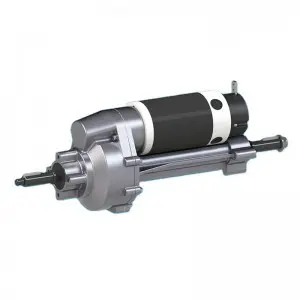When maintaining your lawn mower, one of the most critical components to consider is the transaxle. This important part of the lawn mower is responsible for transferring power from the engine to the wheels, allowing for smooth movement and operation. However, like any mechanical system, the transaxle requires proper maintenance, including the correct type of oil. In this article, we will explore the functions of a lawn mower transaxle, the importance of using the correct oil, and the type of oil that is suitable for a lawn mower transaxle.
What is a lawnmower transaxle?
A lawn mower transaxle is a transmission and axle combination designed to power the wheels of your lawn mower. It allows variable speed control and helps maneuver the mower on different terrains. A transaxle usually consists of gears, bearings, and a housing that contains the oil needed for lubrication.
Transaxle functions
The main function of the transaxle is to convert the rotational energy generated by the engine into linear motion. This is accomplished through a series of gears that regulate the speed and torque delivered to the wheels. The transaxle also plays a vital role in the mower’s ability to maneuver on slopes and uneven ground, making it an integral part of the machine’s overall performance.
The importance of oil in the transaxle
Oil has several important functions within the transaxle:
- Lubrication: Moving parts within the transaxle create friction, leading to wear. Oil lubricates these parts, reducing friction and preventing damage.
- Cooling: The transaxle generates heat when operating. The oil helps dissipate heat, ensuring the transaxle remains within optimal operating temperature.
- Contaminant Removal: Over time, dirt and debris can accumulate inside the transaxle. Oil helps suspend these contaminants, preventing them from causing damage to internal components.
- Sealing: Oil also helps seal gaps within the transaxle, preventing leaks and ensuring the system remains pressurized.
What type of oil does a lawnmower transaxle use?
Choosing the correct type of oil for your lawn mower transaxle is critical to its longevity and performance. Here are some common oil types used in lawn mower transaxles:
1. SAE 30 Oil
SAE 30 oil is a single-grade oil generally recommended for use on lawn mower transaxles. It is suitable for higher temperatures and provides excellent lubrication. However, it may not perform as well in colder conditions, where a multi-grade oil may be more suitable.
2. SAE 10W-30 Oil
SAE 10W-30 is a multi-grade oil that provides better performance over a wide range of temperatures. It is particularly useful for lawn mowers operating in different climates, as it provides good lubrication in both hot and cold conditions. Due to its versatility, this oil is often recommended for transaxles.
3. Synthetic Oil
Synthetic oils are engineered to provide superior performance compared to conventional oils. They provide excellent lubrication, better temperature stability and increased resistance to breakdown. While synthetic oils may be more expensive, they may be worth the investment for those looking to maximize the life of their lawn mower transaxle.
4. Gear Oil
Some lawn mower transaxles may require gear oil, especially those designed for heavy-duty applications. Gear oil is thicker than standard motor oil and provides enhanced protection for gears and bearings. Be sure to check the manufacturer’s specifications to determine if the gear oil is suitable for your lawn mower.
How to Change the Oil in a Lawn Mower Transaxle
Changing the oil in your lawn mower transaxle is an important part of maintenance. Here’s a step-by-step guide to help you through the process:
Step 1: Gather your supplies
You will need:
- Suitable oil type (see user manual)
- a drain pan
- a funnel
- Wrench or socket set
- A clean rag
Step 2: Prepare the Lawn Mower
Make sure the mower is on a flat surface and turn off the engine. Let it cool before continuing.
Step 3: Drain the old oil
Locate the drain plug on the transaxle. Place the drain pan underneath and use a wrench to remove the plug. Let the old oil drain completely into the pan.
Step 4: Replace the oil filter (if applicable)
If your lawn mower has an oil filter, now is the time to replace it. Follow the manufacturer’s instructions for removing and installing the new filter.
Step 5: Add new oil
Use a funnel to pour new oil into the transaxle. Be careful not to overfill; see owner’s manual for correct oil capacity.
Step 6: Replace the drain plug
After adding new oil, replace the oil drain plug securely.
Step 7: Check for leaks
Start the lawnmower and let it run for a few minutes. Check for leaks around the drain plug and oil filter. If everything looks good, you’re ready to start trimming!
in conclusion
Maintaining your lawn mower transaxle is critical to ensuring optimal performance and longevity. Using the correct type of oil is a critical part of maintenance. Whether you choose SAE 30, SAE 10W-30, synthetic or gear oil, be sure to refer to your owner’s manual for specific recommendations. Regular oil changes and proper lubrication will keep your lawn mower running smoothly, allowing you to handle your lawn care tasks with ease. By understanding the importance of the transaxle and the role of engine oil, you can ensure that your lawn mower remains in top condition for years to come.
Post time: Sep-25-2024


